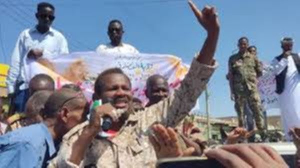Urban Transport Planner and Resettlement Specialist at the Kwame Nkrumah University of Science and Technology (KNUST), Prof. Michael Poku-Boansi has called on the government to introduce robust transport systems that will minimize the financial stress on lower income people in Ghana.
The transport systems, according to the renowned planner should also aim at improving accessibility, affordability and mobility needs of the people.
In a seven-paged research and policy document, dubbed, "Transport Poverty in Africa-Planning for our Mobility Futures in an Era of Sustainability", Prof Boansi said Ghana's rapid development hinges on a well thought out transport systems that will cater for mobility needs of the poor, small scale businesses and all sectors of the economy.
Findings
The research and policy document which was copied to OTEC News Desk, explained that, many residents in cities in Ghana are confronted in their daily lives with unreliable transport.
The situation according to the policy document has lead to transport poverty, undermining the attainment of the Sustainable Development Goals in the country.
The documents further revealed that transport poverty in Ghana manifests in terms of poor social amenities, exposure to air and noise pollution, limited access to public transport routes amid low vehicular ownership.
As per findings in the report, households also spend higher proportion of their incomes on transport.
Recommendations
The research and policy document which seeks to provide time intervention to the challenges detected also came up with what Prof Michael Poku-Boansi described as 'pragmatic solutions' to stir up development in Ghana.
The recommendations are as follows:
The document proposed an integrated land use and transport planning regime where the Ministry of Transport (MoT) and Land Use and Spatial Planning Authority (LUSPA) should work towards improving accessibility levels as the overriding priority. Addressing the prevailing accessibility challenges and averting the possibility of them worsening should begin with addressing the problem of uncontrolled urban expansion.
Redevelopment of informal settlements and slum into sustainable communities (SDG 13). Most people living in material poverty in African cities live in informal and slum settlements, many of which are located a long way from the centralized economic and social activities of the city (Venter, 2011). In instances where they are located more centrally, they occupy vast areas of land, most of which lack any formal pathways or transport infrastructure (Lucas et al., 2019). This causes a spatial dislocation between key destinations, such as employment centres, schools, and hospitals, often leading to long journey distances and travel times (Lucas, 2011).
There is the need, therefore, to redevelop these informal and slum settlements into sustainable communities (SDG 13) where access to basic socio-economic facilities abound, thus reducing the need to travel substantially.
The Ministry of Works and Housing, Ministry of Local Government, Decentralisation and Rural Development, and LUPSA should drive this process.
Preparation of Local Transport Plans (LTPs) in addition to the preparation of District Medium-Term and Structure Plans at the local levels in Ghana, propose the preparation of LTPs. LTPs are strategic documents outlining policies for sustainable transport in local areas.
The aim of the LTPs should be the development of a sustainable and inclusive transportation system that seeks to ensure travel time savings, reductions in travel costs, accessibility improvement, and reduced negative impact of transport on the environment. Implementation of public transport service schemes (e.g., BRT)
There is an urgent need for the government of Ghana through the Ministry of Transport to seriously implement public transport service schemes (e.g., BRT) as one of the best ways to stabilize transport costs and particularly minimize the financial stress on lower income people, improve accessibility, affordability, and mobility needs of the people. The case of Dar as Salaam should inspire us as a country.
The Ministries of Roads and Highways must ensure that newly developing road infrastructure projects must include the infrastructure needed to support cycling and walking in our cities. Aside from the health benefits associated with being active, it will in the long run reduce government expenditure on healthcare as well as provide a sustainable means of travel for most of our people.
National Transport Poverty Index (NTPI)
An NTPI, led by a partnership between the Ministries of Transport and Local Government, Decentralisation and Rural Development, and Academia to measure how far the various districts in Ghana are addressing transportation challenges.
These were among the many solutions the professor proffered in his policy document.
Regional News of Friday, 23 June 2023
Source: otecfmghana.com

















